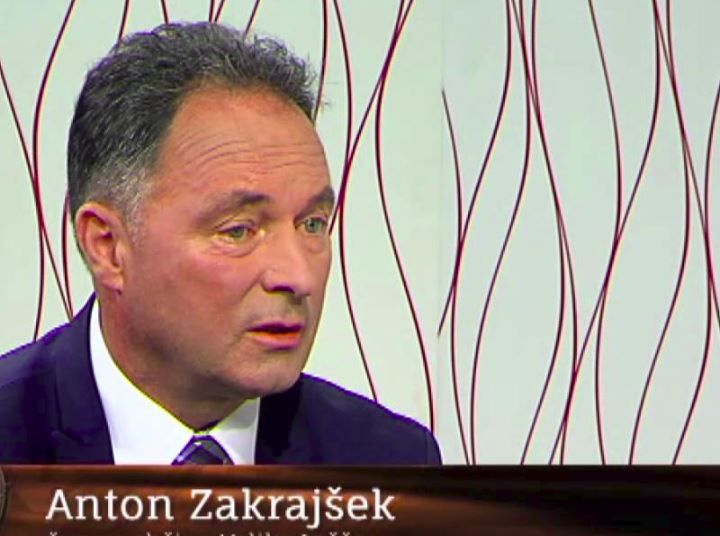News
STA, 8 March 2019 - Slovenia ranks high among EU member states in terms of the proportion of women in senior management positions. However, even as the rate is increasing, it is still far below targets set a few years ago.
Data released by Eurostat ahead of International Women's Day indicate that almost half of managerial positions in Slovenia are filled by women (47%) and one in four senior executives is female.
This places Slovenia fifth among EU member states, with EU average at 36% and 17%, respectively. The data take into account positions in public and private sectors.
While still above EU average, Slovenia is not among the leaders when it comes to the percentage of women on board members of publicly listed companies, which is at 27%, only a percentage point above EU average.
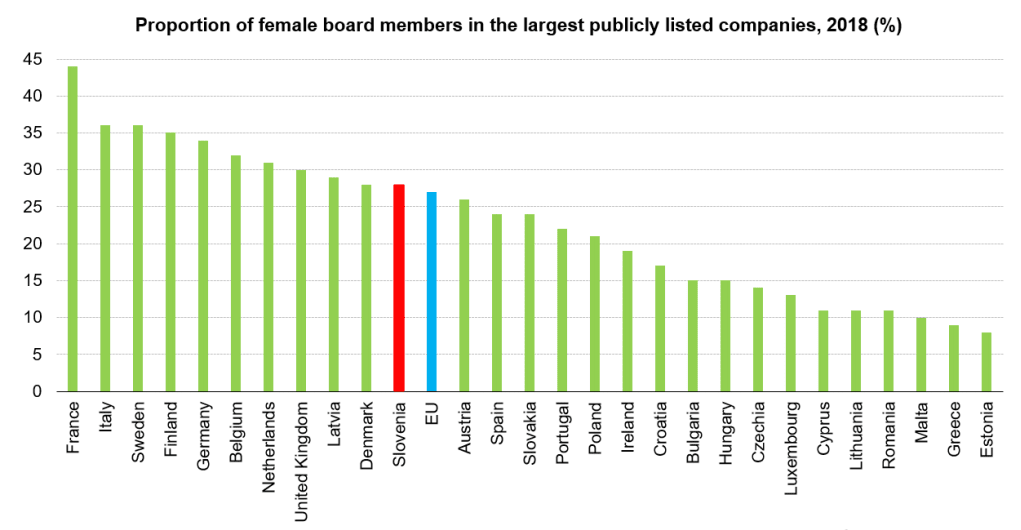
Similarly, data from the European Institute for Gender Equality show that the proportion of women in senior positions in largest listed companies in Slovenia is increasing.
The proportion of women CEOs, executives and non-executives in such companies rose to 24.7% in 2018, the highest in recent years.
Commenting on the figures, the Manager Association said that this was still far from the target of 40% by 2020, set in a EU directive proposal in 2013 by the then Justice Commissioner Viviane Reding.
The association has been advocating legislative changes to improve gender equality in top corporate positions, pointing to surveys showing companies with gender-balanced managements perform better.
This is also evident from the the Women in Work Index, a survey conducted by Pricewaterhousecoopers, where Slovenia gained one spot to place 4th among the 33 OECD countries.
Consultancy Bisnode has surveyed 18,300 businesses whose chief executives are women, finding that while those represented 25% of the economy, they generated 37% of total revenue and 39% of total profit in 2017, employing 37% of the workforce.
The analysis also showed above-average efficiency of "women businesses", having turned one euro into almost 1.3 euro of profit, which compares to the overall average of 0.9 euro.
Melania Seier Larsen, executive director of Boston Consulting Group and vice-president of the women manager section at the Manager Association, noted disparity between women university graduates and those in senior positions.
"Women represent as much as 58% of graduates, but then there are only 20% women executive directors and only 5% of women are chief executives," she said.
Trends in science are similar; while about as many women as men graduate or even win a PhD degree, the proportion of women as they pursue their careers to regular professorship drops to 17%.
Larsen noted that gender inequality in decision-making positions was huge, quoting World Economic Forum in projecting that at the current pace it would take 100 years to close the gender gap.
The full report, in PDF form, can be found here
To an entire generation of Slovenes, the name Angela Vode would have meant nothing. Even today bringing up the name of Ms Vode in the company of Slovenes may result only in confused stares and faces of disinterest, confused as to why you interrupted their coffee to talk about some dead woman from the past. But Angela Vode isn’t just some dead woman from the past, far from it. Angela Vode was one of those unfortunate souls who gave their entire life over to helping their fellow humans only to be consistently arrested because of it. Her life story isn’t a million miles away from mirroring Slovenia’s own in modern times.
Angela Vode was born on January 5, 1892, the third daughter of five children in a poor, working-class family. Her father was a chap by the name of Anton, who worked as a railwayman until his death in 1904. Little is known of her mother, other than the fact she passed away in 1919. Angela’s upbringing was fairly typical of a working-class Slovene girl in the Austro-Hungarian Empire at the time, which means her future job prospects were ‘teacher’ or ‘wife’, or maybe even ‘wife of teacher’. ‘Wife and teacher’ legitimately wasn’t an option, unless it was ‘teacher and wife of teacher’. Married women were forced (by law) to give up their jobs unless they were teachers marrying teachers.
This is the societal system that Angela Vode was born into, and therefore you can understand why she was just a little bit miffed about it all. Angela graduated from a teaching school in 1911 and worked as a teacher in and around Ljubljana all the way up until 1917 when she was fired because of her ties to a youth movement known as Preporod (Rebirth), who were openly anti-Austria and all in favour of a future Yugoslav state. Despite being considered a ‘red feminist’ Angela continued on the educational path post-firing, studying special education in Prague, Berlin and Vienna before returning to Slovenia to work as what was then called a ‘teacher-defectologist’, which basically means ‘teacher of children with disabilities’. Angela actually published a number of articles on the education of disabled children, as well as a book in 1936 titled ‘The Importance of Auxiliary Schools and Their Development in Yugoslavia’. Well, it was called ‘Pomem pomožnega šolstva in njegov razvoj v Jugoslaviji’, to be precise.
The education of disabled children wasn’t Angela’s numero one focus however, no matter how forward thinking she was on the matter. The 1920s saw Angela Vode fast become one of the most vocal supporters of women’s rights in what was first the Kingdom of Serbs, Croats and Slovenes and then the Kingdom of Yugoslavia (from 1929). The history of women’s rights organisations in Slovenia was not a long one, the first such organisation being established in the city of Trieste (now in Italy) in 1887. Angela was elected president of the Women’s Movement of Yugoslavia, as well as president of the Female Teachers’ Society of Slovenia (established in 1898), which carried the slogan ‘for equal work, equal pay’. The mid-1930s saw her publish a number of works on the subject of women’s rights and social injustice, although the events of the 1940s in Yugoslavia meant these books would cease to exist until after Yugoslavia had itself ceased to exist.
Again we must travel back ever so slightly. In 1922 Angela joined the then-illegal Communist Party of Yugoslavia, in what she described as an act of idealism born out of a sincere belief in the fight against injustice. She stuck with the party until 1939, when she was expelled for openly criticising the Molotov-Ribbentrop Pact that saw Hitler and Stalin agree to carve up Eastern Europe. World War Two soon came to the Yugoslav lands, and despite her frequent warnings about the importance of a united anti-fascist front, the resistance in Yugoslavia split into many parts. Despite her expulsion Vode decided to join the commie-led Liberation Front of the Slovene People, quickly becoming the top representative of the Slovene women’s movements. In late 1941 Vode joined Stara Pravda (Old Justice), but the expulsion of this group a year later signalled misery on Angela’s horizons.
She continued to do her bit to help the resistance however, organising collections of food and clothing for Slovene refugees and those in labour camps. How one gets food and clothing into a fascist labour camp I have no idea, but I digress. Vode was in Italian-occupied Ljubljana at the time, and whilst this wasn’t the greatest place in the world it was simply heaven compared to the existence of the Slovenes in the Nazi-occupied areas of the country. This led to a whole heap of Slovene refugees moving into Ljubljana, and in late 1942 the Italian authorities decided the best way to deal with this was to start executing whomever it deemed unnecessary. Like any human with a heart, Vode decided to appeal to Italian leader Benito Mussolini to stop the executions, but her protest was destroyed by the Slovene communists who wanted to be the sole source of protest and resistance in order to enhance their claim to power when the war was over.
The war was soon over (well, a couple of years or so later anyway) and things didn’t look too rosy for Angela. She went back to working as a teacher, but as the communist stranglehold on power increased her future looked increasingly bleak. The fact that she was one of the few who tried to organise legitimate political opposition to the communists didn’t help, and her standing as an intellectual on the other side of the fence all but guaranteed her a visit from the secret police. That visit came in the autumn of 1947, and Angela was arrested and imprisoned for two months. After two months of torture and abuse, Angela Vode was put on trial, by which I mean after two months of torture and abuse Angela Vode took part in a show trial. She was charged with treason, accused of being an enemy of the working class, a western spy and any other stereotypically 1940’s communist thing one could be arrested for. These were the Nagode Trials, named after the leader of the aforementioned Stara Pravda movement, Črtomir Nagode. The ‘trials’ saw 15 intellectuals found guilty of treason and sentenced to death or life imprisonment.
Vode got 20 years, and whilst she only served six of these years thanks to international fury, she didn’t exactly return to a free and joyous wonderland in 1953. Vode was declared a ‘non-person’, that is a human being without any rights whatsoever. She wasn’t allowed to find employment, enjoy a personal income or get medical insurance. She was denied her passport, and her name was prohibited from public life. Her works, such vital and important works concerning women’s rights in the country, could not be quoted in any way, shape or form. It was as if Angela Vode had never existed, and this vibrant and revolutionary mind was reduced to being completely in the care of her sister Ivana. In the late 1960s, Angela began work on her memoirs, finishing what was known as ‘The Hidden Memoir’ in 1971. It wouldn’t see the light of day until 2004.
After the death of Tito in 1980 there began to be small ripples of interest in her oft-whispered about works throughout the Slovene republic. On the 50th anniversary of her book ‘Women in Contemporary Society’, she gave a low-key interview to the magazine Nova revija, marking her first public appearance in over 30 years. One year later she passed away at her home in Ljubljana, dying in May 1985 at the age of 93. She didn’t live to see the Slovene court annul the verdicts of the Nagode Trials, although after being robbed of her final 30 years justice would be nigh on impossible.
Vode has been posthumously rehabilitated, and slowly but surely her works have begun to reach more people. Despite being written almost a century ago they are still relevant today, with Vode expressing a desire to cherish the natural differences of the genders whilst putting forward the necessity of equality at the same time. She attacked subjects that were almost holy at the time, such as the role of husband and wife in parenting, stating she did not understand ‘…why a wife by nature would be more destined for motherhood than a husband for fatherhood’. She wrote extensively about gender roles as well as the influence of nature and nurture in those roles. Vode urged women to learn about the past, believing that only by understanding society could one improve one's position. She implored that a healthy marriage could only exist with love, friendship, mutual respect, understanding and economic independence. She stripped down the question of gender roles in society, saying that ‘…a woman is as integral a part of human society, nation, state and family as a man, and her life and position are equally dependent on all political, economic, and cultural developments, and a demand for her participation in public life is absolutely natural and necessary’.
Angela Vode was and still is a vital voice in the women’s rights movement in Slovenia, and it is a tragedy that she simultaneously became a poster girl for the abusive and criminal side of the semi-totalitarian dream that was socialist Yugoslavia.
If you enjoyed this story, then consider picking up a copy, in digital or paper form, of An Illustrated History of Slavic Misery from Posh Lost Books or following the related page on Facebook, while you can read more of John’s work on his personal website.
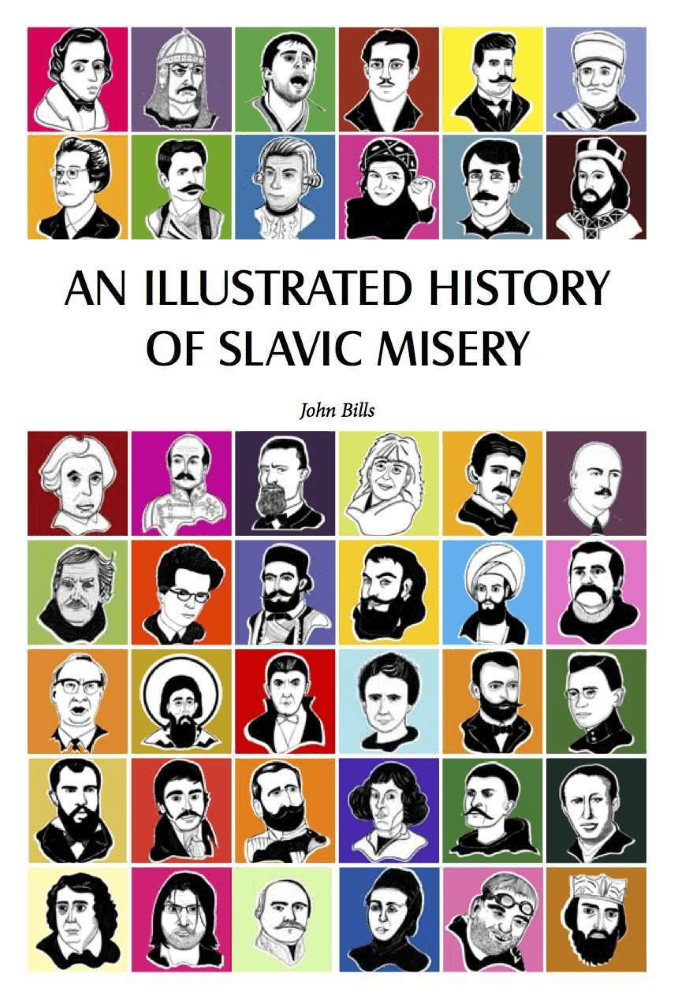
STA, 7 March 2019 - Slovenian banks recorded a cumulative net profit of just over EUR 496m in 2018, the highest since the pre-crisis year 2007 and an increase of almost 17% over the year before on the back of robust growth of non-interest revenue.
Whereas net interest revenue rose by just 3% to EUR 672m due to persistently low interest rates, non-interest revenue surged by over 14% to EUR 482m, shows a central bank report released on Thursday.
The figure confirms earlier findings that banks have been increasing service fees to offset low interest rates.
The sector also profited from the cancellation of provisions for non-performing loans, though that contributed only EUR 48m to the bottom line, a tenth more than in the year before.
Operating costs increased only marginally, by 0.6% to EUR 700m.
Total assets increased by 2.2% to EUR 38.78bn, in what is the second consecutive annual increase.
Non-banking deposits were up 5.3% to almost EUR 30bn, mostly due to a EUR 1.2bn increase in household deposits.
Loans to the non-banking sector grew at a rate of 3.3% on the back of robust lending to households, which now account for a quarter of total outstanding loans.
Asset quality improved last year as banks reduced exposure to non-performing loans to 4% from 6% measured by the broad definition of the European Banking Authority.
Despite the rapid improvement, the share of non-performing loans to the corporate sector remains high, at 8.4%. This is however a 4.5-point improvement on the year before.
All our stories about Slovenia and banks can be found here
STA, 7 March 2019 - The Ljubljana District Court acquitted Ljubljana Mayor Zoran Janković of bribery charges in the Gratel case on Thursday. The prosecution sought a three-year prison sentence and a EUR 50,000 fine for Janković. It also wanted the Ljubljana municipality to return the donation it received from the company Gratel.
The ruling is not final yet and prosecutor Blanka Žgajnar announced an appeal.
The case concerns EUR 500,000 which the mayor demanded from construction company Gratel in March 2007 to allow it to dig roads to install optic cables.
Gratel then transferred two EUR 250,000 instalments to the municipality as a donation for the renovation of Ljubljana Castle.
This enabled it to resume its work under a new development permit after Janković had initially banned Gratel from digging on public premises.
Janković argued that the payment had been made in compensation for the damage incurred by the city because Gratel had dug up wider conduits and installed more cables than agreed.
He maintained throughout the trial there was nothing wrong with a company making a donation to a public institution, saying it caused no harm to anyone and nobody except the prosecutor was claiming anything back.
Gratel owner Jurij Krč backed up his story, saying the donation to Ljubljana Castle was not a bribe but a payment in line with the contract, while former Gratel CEO Drago Štrafela said he did not understand why the money should be paid to the municipality, arguing the city suffered no damage.
In presenting closing arguments today, prosecutor Žgajnar said Janković had used his power to pressure Gratel into the donation. "When they did that, he allowed them to continue the work," she said.
"Donations are not forbidden if they are voluntary," she stressed, adding that three witnesses had confirmed that the defendant had demanded money. She believes that the one witness who did not confirm this was not telling the truth.
But Judge Vladislava Lunder said today that the evidence presented had not corroborated the claim that Janković had demanded a bribe and that none of the witnesses had confirmed this.
"None of the witnesses confirmed the claim that Janković made obtaining the permit conditional on the payment of the damages," the judge said.
The problems of the project as part of which Gratel was building an optical network for operator T-2 had started in 2006, which is before Janković became mayor. According to Lunder, not only testimonies of witnesses but also documents presented as evidence showed this.
The judge was not convinced by the prosecutor's claim that Janković had revoked the permit to Gratel only to allow it to continue work once it paid a bribe.
Žgajnar moreover said that Štrafela had softened his statements compared to those he had given to police during the investigation. She believes it was him who had made the deal with Janković.
Janković's lawyer, Janez Koščak, said that no proceeding had been filed against the person who allegedly paid the bribe so technically there was no bribe to be accepted by Janković or the municipality.
He said Janković was on trial for acting with due care and diligence by demanding compensation after a contract partner had violated the contract. "If he hadn't done that he could be indicted for negligence."
Janković said today the had been the target of a political campaign by four persons, including Žgajnar, for the last four years. He believes this attack had been triggered by a "pamphlet of the parliamentary enquiry which was led by Alenka Jeraj of the SDS."
Jeraj of the opposition Democrats led between 2009 and 2011 a parliamentary inquiry into major public construction projects and other major investments funded from the Ljubljana or state budgets.
The final report of the inquiry commission, which had also investigated construction deals of companies owned by Janković's family members, suggested that Janković abused his power to allow his sons to profit from a re-zoning plan that opened agricultural land for construction.
All our stories on Ljubljana Mayor Zoran Janković can be found here
STA, 7 March 2019 - A statement by children's doctor and psychotherapist Viljem Ščuka equating sex and rape has been declared the most sexist statement of 2018 by the organisers of feminist and queer festival Red Dawns.
"Mass rapes of girls (schoolmates) are not possible if girls are against. Both participants are responsible for sexual intercourse because it takes place with both being fully conscious ..."
Ščuka, 80, made the statement for the news portal Svet24 commenting on a former teacher's proposal about how to tackle problematic, violent primary school children.
It earned him the Silver Thistle title, which is conferred annually to raise awareness about sexist statements which are usually overlooked.
"This dishonourable title is given to those who publicly attack, humiliate or offend others on the basis of sex, sexual orientation and/or sexual identity," according to the festival's website.
The citation of the Silver Thistle said Ščuka's statement "equalises sexual intercourse with sexual violence and shifts responsibility for violence onto victims, which is not only unacceptable but also dangerous".
It added it was hard to understand anyone would think rape takes place with the victim's consent and even harder if such a statement was made publicly by an expert.
The Silver Thistle is given out on the basis of an online vote by the editorial board of spol.si, a news portal focussing on gender issues, and the Red Dawns collective, which organises the festival of the same name.
The most sexist statement of last year was declared Wednesday evening.
Last year, the dishonourable title went to acclaimed jurist Boštjan M. Zupančič, who labelled French politician Simone Veil (1927-1979) a murderer for allowing abortion.
https://www.total-slovenia-news.com/lifestyle/748-slovenia-s-most-sexist-statement-of-the-year-award
STA, 6 March 2019 - Transparency International Slovenija (TI) has reported the director of the Agency for Commodity Reserves Anton Zakrajšek to the state prosecution over suspected abuse of office in the procurement of what is currently a 179-km fence on the border with Croatia.
Following allegations that the procurement of the fencing favoured a specific contractor, TI obtained part of the documentation after almost three years of efforts, receiving a nod from the Information Commissioner and engaging in a tug-of-war with the agency in courts.
Screenshot from YouTube
TI believes Zakrajšek abused his powers when signing a razor wire contract with Minis in 2015 which included the provision of an advance payment of EUR 860,832 or 70% of the contract's total value.
Minis has been the main supplier of "technical obstacles" that Slovenia started erecting on the Croatian border during the migration crisis. It has received more than EUR 9.3m from the agency, while the remaining suppliers have been paid a total of EUR 6m, the newspaper Dnevnik reported today.
TI says the agency would have required special consent from the finance minister for the advance payment, which it does not appear to have received, while Zakrajšek is arguing the payment had never been executed.
The official, who is adamant that Minis was always picked as the cheapest bidder, argues the advance payment had been conditional on the supplier securing a bank guarantee in the full amount of the payment, which it failed to do.
What is more, the Finance Ministry said this provision only applied to direct budget users, while the agency is not defined as a budget user at all.
TI responded by saying "the alleged advance payment is only one of the suspicions elements, while confirming or rejecting the suspicion is in the domain of the relevant authorities". The NGO told the STA it saw no reason to withdraw its report.
TI only asked for a portion of the documents, as much of the fence procurement documentation remained classified as internal. The STA has not yet received an answer from the government about whether it planned to declassify them.
The agency said in a press release in the afternoon that the documents were classified because their contents could put in jeopardy the government's objectives to regulate migration flow.
Moreover, Zakrajšek said in the press release that the agency had asked Minis for a bid because the company had already been cooperating with the Interior Ministry at that point and the department had no complaints. The Interior Ministry also provided the specifications for the fence, the press release said.
The fencing contracts, signed under special provisions governing procurement in cases labelled classified, have been raising eyebrows for some time.
Alenka Bratušek, the head of the SAB party who was an MP at the time, caused waves after a 2017 session of the parliamentary Commission for Public Finance Oversight, when she claimed the documents studied had been manipulated with and that the chosen bidder had not been the cheapest.
SAB secretary general Jernej Pavlič said today that Bratušek had forwarded her findings at the time to the prosecution.
Zakrajšek insists the chosen bidder had been the cheapest and fastest and claims Bratušek is misleading with her accusation, which he says is based on a mistake that occurred in one of the minutes.
Media have also been wondering about the choice of Minis, with POP TV reporting on Tuesday that the company and a local office of the Modern Centre Party (SMC), the senior coalition party between 2014 and 2018, shared the same address for a while.
SMC leader Miro Cerar responded to the reports by saying the intensive migration pressure in 2015 required the decision to protect people and property.
"This was the task I put to the ministers," he said, expressing his belief the decisions followed professional criteria and legal obligations. "I believe Economy Minister Zdravko Počivalšek acted in due fashion."
All our stories on corruption and Slovenia are here
Below is a review of the headlines in Slovenian dailies for Friday, 08 March 2019, as summarised by the STA:
DELO
Gender equality
"For successful society we need both sexes": The newspaper you are reading is issued by a company employing 318 people, including 150 women. Nine out of 16 senior managerial positions are filled by women. (front page, pages 5, 7)
Gorenje expansion
"Televisions to create thousand new jobs": The new television factory to be built by Chinese-owned Gorenje in Velenje by the autumn next year is to create more than a thousand jobs in a few years, Franjo Bobinac, chairman of the board of directors, told the Delo Saturday supplement in an interview. (front page)
Sick health minister
"Health minister on the way to recovery": Prime Minister Marjan Šarec would neither confirm nor deny yesterday whether he would like to replace the health minister, who has been ill, but the Health Ministry said that Samo Fakin was expected back to work next week. (front page, page 3)
Alpine Ski World Cup meet in Kranjska Gora
"Žan and Štefan ready": Home favourites Žan Kranjec and Štefan Hadalin are looking forward to the Alpine Ski World Cup meet in Kranjska Gora this weekend. (front page, page 18)
DNEVNIK
Gender equality
"Dear women, if we could we would pay tribute to each one of you with a flower": On International Women's Day, the paper examinees women's position in society and puts into spotlight ten most influential women in Slovenia. (front page, pages 2, 3)
Public procurement
"Did car dealers abuse public tenders?": Information available to the paper indicates that the anti-trust agency has been investigating suspected cartel collusion by major car dealerships in applying for public procurement calls. (front page, page 4)
FINANCE
ECB
"Money cheap at least until year's end": The European Central Bank has downgraded its economic outlook for the eurozone while announcing it will launch a new round of long-term liquidity loan auctions. (front page, pages 2, 3)
Taxes
"Will govt be kinder when taxing capital gains?": The Finance Ministry is considering watering down proposals on capital gains tax so that the zero-tax rate would be kept for capital owned for at least 20 years. (front page, page 4)
GZS awards
"These are this year's GZS business Oscar winners": The Chamber of Commerce and Industry has presented awards for exceptional achievements to six businessmen. (front page, page 6)
VEČER
Maribor development plans
"Lent will be different": The coalition of Maribor Mayor Saša Arsenovič is praising budget plans, while the opposition is pointing to a development lag and costlier services. (front page, pages 8, 9)
GZS awards
"Business Oscars presented": The six winners of the Chamber of Commerce and Industry's awards for business achievements are focused on the future, sustainable development, and green energy, they invest heavily in development, and are virtually debt-free. (front page, page 6)
Cancer
"Cancer is a sign of the times": You have to face up to the disease and ask yourself what you can change, says the ambassador of the cancer prevention programme Svit. (front page, page 3)
Healthcare
"30 new jobs in healthcare": The Ptuj community health centre has launched a mental health unit. The programmes of services launched this year and last are estimated at EUR 1.9m. (front page, page 15)
Judiciary
"Omerzu wins disciplinary acquittal": After being suspended as the president of the Maribor Labour Court last year, Stanko Omerzu has now been cleared of disciplinary charges. He is still being tried for stalking. (front page, page 21)
Where did you live before Slovenia, and what brought you here?
I was born in Iran and moved to the UK when I was two years old. I lived in Cumbria until the age of 15 and then moved to London. My mum moved the family to London so I could fulfil my dreams of working in television, and opportunities for this are plentiful there. My husband is Slovenian and, to be honest, if i didn’t meet him, I wouldn’t know much about Slovenia, if anything at all. After he and I got together, we visited many times until we eventually moved here.
What were your first impressions of Slovenia, and how do they compare with what you think now?
In 2012, early in our relationship, my husband brought me a book about Slovenia. The images were breath-taking. He also brought me gibanica and a bottle of pumpkin seed oil. I loved them, but I’d never been to Slovenia and barely knew anything about it.
I first came here in 2013 and I fell in love straight away! I loved the vibe, the energy and hospitality of the people, how clean the country was, how easy it was to get around, the amazing places to see, the food, the fresh air - pretty much everything. I can’t think of anything I didn’t like. I’ve seen more of it now, met more people, made more friends and learned more. I fall in love with Slovenia more and more as time goes on.
What do you wish someone had told you before you moved here?
I wish I had the contacts I do now. I wish I had done more intense research before coming here so I would have been to more events and met people much earlier. I advise anyone who’s moving to another country to do as much research and create connections online prior to making your move more enjoyable, so you’ll settle in faster in the areas that are important to you, and for me that’s business.
Have you started to learn Slovene?
I’ve been hearing and listening to Slovenian for almost six years now so I’ve managed to pick up a few words. I haven’t yet mastered sentences or verbs, but I started classes in February and because of my experience with the language I’m finding them quite easy. I’ve heard several times that it’s a difficult language, and I can understand why so I’m even more motivated to learn.
What methods do you use to learn it?
I ask my husband and friends how to say things and I ask for translations almost every day and listen to people’s conversations. I Google Translate a lot of things, my mother-in-law only speaks to me in Slovenian, and like I said, I’ve started classes.
How did you start looking for work here, and what was that experience like?
I have my own online speaker trainer business. I teach business owners how to deliver effective and persuasive presentations to help leverage time, reach more people and make a bigger impact.
But I love doing live events, and at first I didn’t see a market for it here and I wasn’t looking in the right places, so I gave up the idea of doing those. Then I met someone and he pointed me in the right direction and introduced me to so many different people that eventually I realised that there is an opportunity for me to bring my business here, do live events and teach what I know and love in Slovenia. And that’s what I’ve started to do.
You have a young son, how is he settling in?
My son loves Slovenia (or as he calls it, ‘Felinia’). He loves čevapčiči, the road trips we take - we try to go out of Ljubljana as often as possible. He loves visiting his babi in Novo Mesto, skiing, Atlantis, Tivoli park, the castles, the various workshops for children. Slovenia is definitely one of the world’s most child-friendly countries, so as a family we pretty much settled in immediately.
What are some things from Slovenia you think your home country could benefit from?
How to deal with snow! London goes into a complete shutdown when it snows - trains stop running, major traffic jams and people don’t turn up for work. I was in Kranjska Gora a few weeks ago and it snowed heavily overnight. People started dealing with it effectively the following morning - they just started clearing the snow. By 11am, people were driving normally. Life doesn’t have to stop when it snows - and London can definitely learn a thing or two about this.
The UK can definitely have more cool spots and things to do for young children. For example, my son loves Mala Ulica in Ljubljana- nothing like that exists in London and at such a low price. He also ended up in hospital a few weeks ago they had a huge room in the paediatric wing filled with so many toys, activities and teachers. He loved it! I’ve never seen such a room in any medical centre in London. Also, cheaper cinema tickets, so an evening out costs much less than in London.
And what are some thing from your home country that you think Slovenia could benefit from?
All I can think of is how the country is marketed. I can understand why it isn’t so loud for Slovenia, but it’s such a gem of a country, and I think more people would appreciate visiting and experiencing what it has to offer. Also, I’m yet to understand why we need to drive with lights on when it’s fully bright outside. I sometimes forget to turn the lights on and I get flashed by other drivers. I’m getting much better now, though.
Where are some of your favourite places to visit here?
My favourite part of Slovenia is definitely Ljubljana - I’m a city girl. But Slovenia as a whole is such a beautiful country, it’s difficult to pick one or two places. I love Bled, I love the castles here, Bohinj is stunning, I learned to ski in Kranjska Gora, I love driving to Novo Mesto and Savica Waterfall is amazing! I really love all of it. As a family, we try to take as many road trips as possible.
How do you feel about Slovenian food and drink?
I love Slovenian cuisine. I’ve learned to cook quite a few Slovenian dishes. My mother-in-law’s dishes are amazing and I picked up various recipes from her such as goveja juha, bucna juha, goveji golaz and testani krompir. I really enjoy cooking and eating Slovenian food.
However, something I'm still trying to get over is eating horse. I couldn't believe it at first that it’s on the menu in Slovenia. Unfortunately, I did try some - I was tricked into it - but never again!
What things frustrate you about life in Slovenia?
The thing I don’t like about Slovenia is how cars can turn left or right at a green light the same time as pedestrians can cross. I think this should be stopped to allow cars to cross without putting pedestrians, and drivers, at risk. Sometimes cyclists race across whilst a car is turning, and it’s pretty dangerous. Someone once told me that they’re planning to get rid of this system, so I hope they do it soon.
And what things delight you?
I love how in Ljubljana you can get so much done in one day! Obviously, the fact that it’s small plays a huge part in that. I also feel super productive here. I can’t put my finger on why exactly, but like I said, there’s something about the energy here.
Would you advise a friend to move to Slovenia?
I always do, especially friends with children. Every person I’ve spoken to who has kids and have moved to Slovenia love how easy life is here. When I tell people about the country, they think it’s too good to be true.
So do you think you’ll stay in Slovenia for the rest of your life?
I don’t plan so far ahead. Moving to Slovenia was a last-minute decision. I know for a fact that I’ll be spending a lot of time in Slovenia even if I don’t ‘live’ here forever. But for now and the foreseeable future Ljubljana is home, and I love it that way.
Where can people find out more about you and your work?
The best place is my website - www.haniehvidmar.com, I’m also holding my first event here, in Ljubljana, on April 19, at Celica. You can find all the details here.
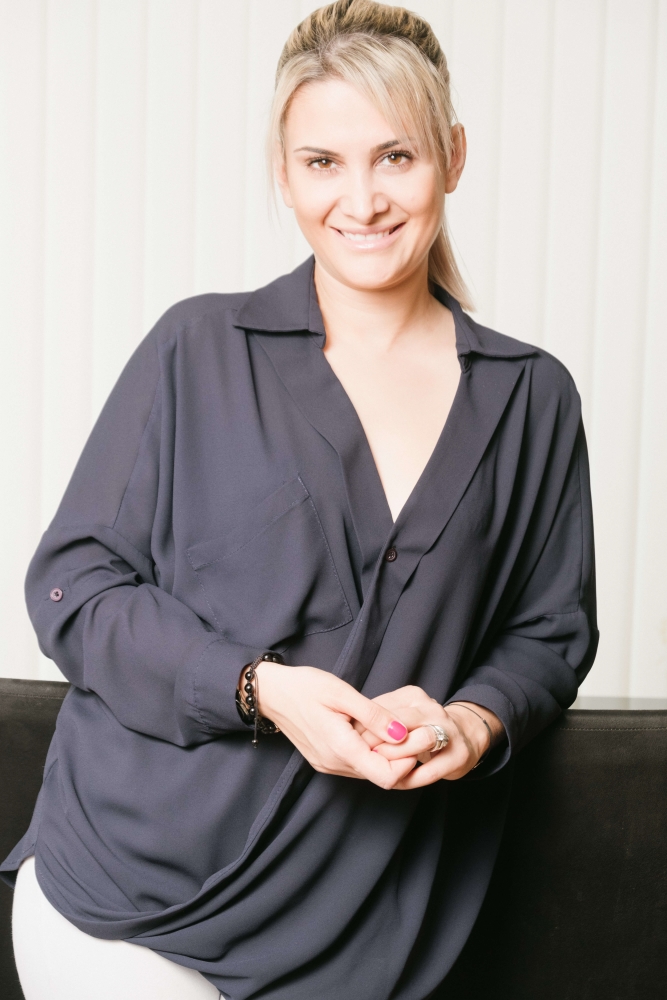
If you’d like to share your story with our readers, please get in touch at This email address is being protected from spambots. You need JavaScript enabled to view it.
STA, 6 March 2019 - The Chamber of Commerce and Industry (Gospodarska zbornica Slovenije - GZS) has proposed a reform of the pay system in the corporate sector for 2019-2025 centred around tying wage growth to productivity gains, echoing its long-standing position that pay should be more performance-based.
https://eng.gzs.si/
Under the proposal unveiled on Wednesday, average gross wages would increase by nearly a quarter by 2025, provided that annual productivity gains almost doubled compared to 2014-2018, from 2.7% to 4.8%.
The goal of the proposal is to increase value added per employee to EUR 60,000 and exports to EUR 50bn. In that case, the average gross wage would be EUR 2,000, GZS director general Sonja Šmuc said.
Slovenia's exports amounted to EUR 31bn last year, the average private sector gross wage was at EUR 1,647 in December, whereas value added per employee was EUR 43,000 in 2017, the latest year for which data are available.
"Assuming appropriate productivity gains, the average gross wage could rise by EUR 370," GZS chief economist Bojan Ivanc said.
Related: Find out the average pay for various jobs in Slovenia
To achieve the required productivity gains, Slovenia has to step up investments in research and development and improve vocational education, according to Šmuc.
At the same time, wages in the public sector must grow at a slower pace than private sector pay, and the retirement age must gradually converge towards the EU average.
"It is time to talk about this now, not when we already have major problems funding pension," Ivanc pointed out.
The GZS has sent its proposal to all social partners and will now try to reach a consensus. Negotiations are expected to start next week.
Meanwhile, employers and trade unions have voiced reservations about the proposal. An exception is the ZSSS, Slovenia's biggest trade union confederation, which believes the goals could be reached.
Marjan Trobiš, the head of the Employers' Association, expressed surprise that the proposal was presented as having the backing of the entire business sector.
He said that his association had only gotten the text yesterday and had not yet had the chance to become fully acquainted with the document. He is also surprised that negotiations are to start as early as next week.
Igor Antauer, the secretary general of the Trade Crafts and Small Business Employers' Association, said that the proposal had not yet been coordinated among employers.
"It's a shame that somebody was in a hurry ... and that they did not check what would happen to all segments of the private sector not just the industries represented by the GZS."
Pergam trade union head Jakob Počivalšek said that the document was not aiming to raise salaries but to limit them and enable higher pay for managers.
Počivalšek said he was not against investing in R&D and training, but that the proposal provided no guarantees that this would actually be the case and the funds would not be spent on higher pay for top managers.
Lidija Jerkič, the head of the ZSSS, is not as critical. "These goals are nothing new. They can be reached but will require a restructuring of the industrial sector." She added that it was high time to reach an agreement on private sector pay.
March 7, 2019
With regard to the name that will compose party lists in the upcoming European parliamentary elections, we know now that at least four major parties chose women as heads of their lists of candidates. Since the voting system allows voters to also cast a preferential vote to one of the candidates on the list they are choosing, being no. 1 on the list doesn’t necessarily mean you are first to get a parliamentary seat but rather that you serve as a face of that list, and will almost certainly participate in election debates.
So far the lists have been presented by Nova Slovenija (NSi), Socialni demokrati (SD), Levica and most recently also the Prime Minister’s Lista Marjana Šarca (LMŠ), who surprised with some very fresh faces, a bit too fresh, some might say.
Soon Slovenska Demokratska Stranka (SDS) is expected to present their list of candidates, and if they decide to put the current European Member of Parliament Romana Tomc at the head of the list, this would be the fifth woman in such a position so far.
Although women are usually allowed to lead in times of crisis (the so-called “glass cliff”, as seen with Alenka Bratušek becoming prime minister during the peak of the last financial crisis, of Theresa May taking charge after the Brexit vote) or when no chance of winning is in sight (five women were pushed into the race against the incumbent and very popular President Borut Pahor who was running for a second term in 2017). With few exceptions this time the female candidates are strong and experienced politicians, with, hopefully, good chances of winning their European Parliament seats, which continues to be seen as an honorable and well-rewarded job.
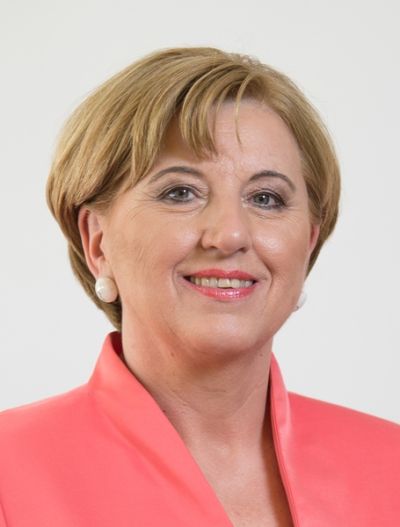
NSi: Ljudmila Novak, one of the strongest female politicians in the country and former party president, managed to beat her party colleague, current member of the European Parliament and one of independent Slovenia’s first generation of politicians, Lojze Peterle, at the top of the list. With Ljudmila at the top, Lojze fell to no. 3.
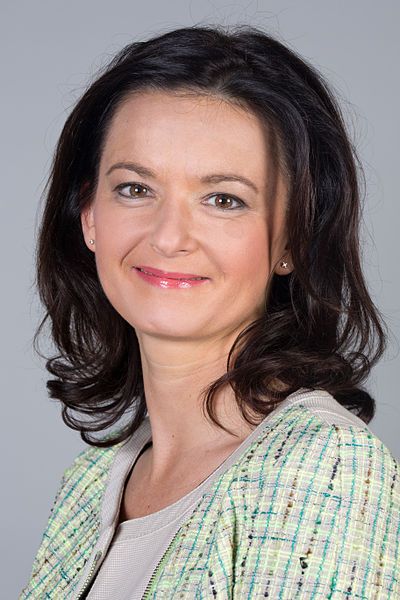
SD: Tanja Fajon, current Member of the European Parliament. One of most active and recognisable Slovenian politicians serving in Brussels.
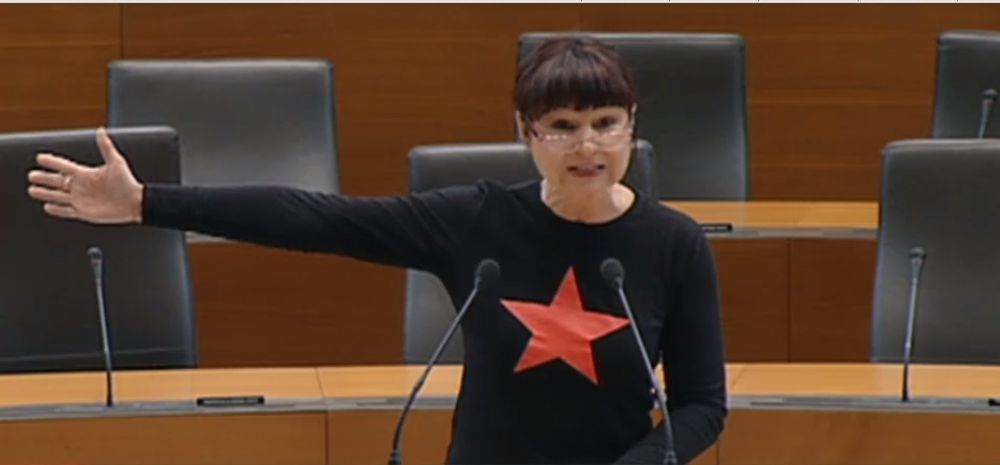
Levica: Violeta Tomič. The former actress is one of the strongest female politicians in Slovenia, and also one of the two transnational spitzenkandidaten of the oppositional “European Left”.
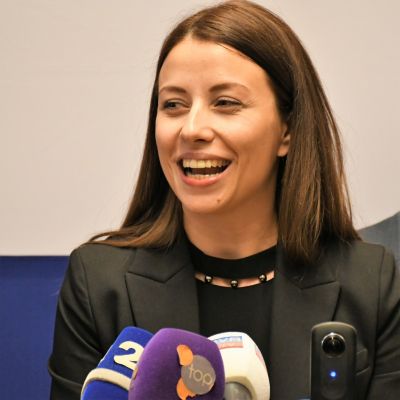
LMŠ: Irena Joveva, a 30 year-old journalist without any political experience.
While recent polls suggest strong popular support for Marjan Šarec List (LMŠ) it remains to be seen how this latest choice might affect the party’s popularity. So far the group’s success has been mainly based on the charisma of its leader and the current Prime Minister, Marjan Šarec.
At the press conference on Monday Šarec explained his party’s choice of candidates with the following words: “This is like sending a song to the Eurovision song contest. It is difficult to know what the winning formula might be.”
STA, 6 March 2019 - A campaign urging people to abstain from alcohol for the next 40 days until Easter started on Wednesday for the 14th year running, reminding the public of the dangers of alcohol consumption.
The campaign, instigated by Slovenian Caritas, the Slovenian Traffic Safety Agency, and the prevention organisation Med.Over.Net Institute, is running under the slogan "For a responsible drinking culture".
It encourages a responsible attitude towards drinking "at home, on the roads, at work, in company or wherever", secretary general of Slovenian Caritas Cveto Uršič told reporters.
The campaign, coinciding with the Catholic period of Lent, supports everybody who is suffering due to the negative effects of alcohol consumption such as violence, accidents, or health problems.
Uršič pointed out the "extremely cruel" statistics in terms of alcohol consumption. At least 1,000 people on average die every year because of alcohol-related reasons. In the last five years, drink driving caused 7,907 traffic accidents in Slovenia, 157 deaths and 732 gravely injured.
"Alcohol often leads to domestic violence, workplace violence, and bullying. It can also result in unemployment and poverty or is caused by them," Uršič said.
The representative of Med.Over.Net Institution, Andreja Verovšek, stressed that giving up alcohol was a decision demanding a lot of persistence and support.
According to the National Institute of Public Health's (NIJZ) data, almost half of Slovenians between 25 and 64 years of age (43%) consume too much alcohol, crossing the recommended consumption limit.
Alcohol-related costs to Slovenia's health system for the period between 2012 and 2016 are estimated at EUR 147m per year. Including all other related costs, such as the ones caused by accidents and domestic violence, the estimate rises to EUR 228m.
The ambassador of this year's campaign, journalist and presenter Igor E. Bergant, said the campaign raised awareness of a major social problem, as well as sent a positive message of educating instead of judging.
He stressed the importance of a zero-tolerance policy while driving or working, and the importance of being a role model for children. Bergant also acknowledged that Slovenia's stance on alcohol consumption had always been over-tolerant and therefore problematic.
Slovenian Caritas has included older pupils of primary schools and high school students in the campaign, inviting them to contribute to the prevention project with their own ideas and creations. They were encouraged to consider maintaining relationships, health, prosperity, and fun without alcohol and other drugs.
All our stories about alcohol abuse and Slovenia can be found here


